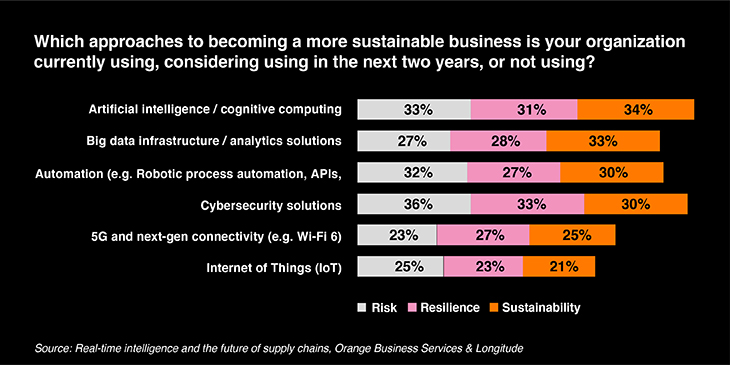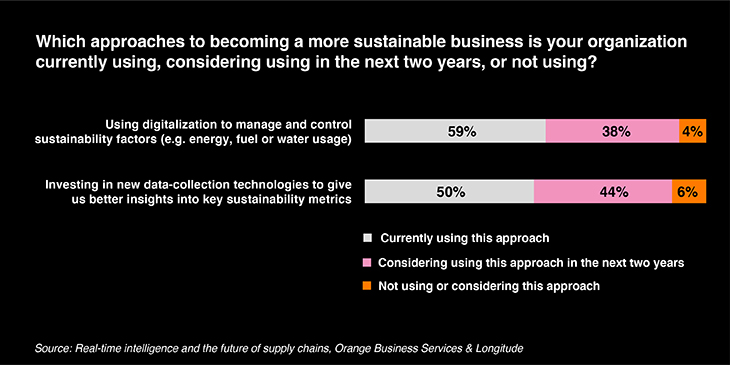COVID-19 is the final blow to supply chains that revered reliability and efficiency over resilience and sustainability, according to the World Economic Forum (WEF). Without visibility into how materials and products move through the supply chain, enterprises can't effectively monitor inputs and outputs for sustainable practices, the WEF notes.
Peter Guarraia, the Global Head of Bain & Company's supply chain practice, goes as far as estimating that up to 60% of executives have no insight into their supply chain beyond the tier one group. Supply chain transparency requires an enterprise to understand what is happening in their supply chain and communicate it internally and externally. The pandemic has exposed how few have this visibility.
Thinking in a more sustainable way
By taking a look at supply chain sustainability, businesses can efficiently manage and mitigate different types of risks across the supply chain. As the global economy begins to get back on its feet, sustainability principles have moved center stage. Enterprises have started to re-think their supply chain make-up. Society, planet and profit must find a workable balance.
"Given the critical role of the supply chain in ensuring customer satisfaction and experience, much of the digitalization efforts will be on the shoulders of the chief supply chain officers (CSCO)," explains Mike Burkett, Distinguished Vice President Analyst at Gartner. "This is the greatest transformation of supply chain structures in a long time, and it will not be easy."
Supply chain sustainability provides transparency into its links, which helps satisfy growing demands for more ethically- and environmentally-friendly products. At the same time, consumers are embracing the concept of the circular economy, built around designing out waste and recycling.
Supply chain sustainability can act as a significant differentiator, setting enterprises apart from competitors. It can also help to open up partnerships and attract new talent. Many employees today feel much happier working for organizations that are environmentally and socially responsible, for example.
Addressing sustainability issues
The ongoing uncertainty in the world is necessitating that enterprises adopt a new approach to supply chain management. "CSCOs must build more flexible and resilient networks that can respond effectively to global shocks and disruptions – be it caused by nature or a competitor, says Burkett.
This has triggered the examination of current processes. Are enterprise supply chains fit for purpose in the new normal? In a bid to answer this, Orange Business commissioned Longitude to carry out an in-depth study of 320 of the world's largest enterprises, spanning 18 countries together with interviews with six leading supply chain experts. The report, Real-time intelligence and the future of supply chains, explores the way multinationals are speeding up their AI, data analytics and digitization programs to solve these supply chain challenges, including sustainability.
Of the multinationals that we surveyed, 65% said they are looking to be more sustainable, but due to this year's unprecedented global health crisis, they have focused on keeping the lights on. This is only a temporary halt, however. Cost control is now a primary business objective bound up in a reduction in customer confidence and a global economy in retraction. Therefore, it is little surprise that 64% of enterprises said they are significantly reducing costs due to the pandemic. Linked to this, 85% of enterprises believe cost savings and sustainability can go hand-in-hand. As a result, 78% of respondents see sustainability as a pivotal way to drive product and service innovation, vital to drive customer preferences and business growth.
Many enterprises are already focusing on sustainability: 48% of enterprises say they have already switched to more sustainable suppliers and partners in their supply chains, while 40% have engaged external sustainability consultants to map their next moves. But, there are still those that are lagging.

Sustainability is non-negotiable
There is a common misconception that putting resources into sustainability comes at a cost to business objectives and outcomes. The truth, however, is that sustainability is central to future enterprise growth, given increasing expectations on corporate social responsibility and transparency.
According to Gartner, many enterprises are still not using network design capabilities to track, analyze and optimize environmental impact goals, such as emission reductions. Thus, when these goals require investment, they are out of synch with traditional financial objectives, such as reducing costs.
The landscape, however, is changing. Currently, 58% of enterprises responding to our survey said they digitally control and manage sustainability metrics such as energy, fuel, carbon emissions and water usage, with 38% of respondents saying they plan to do so within the next two years. For example, AI-enabled smart logistics can play a central role in reducing fuel usage and increasing on-time deliveries.

Big brands are leading by example. Multinational consumer goods company Unilever has set an ambitious goal to zero out all emissions for its own operations and those of its suppliers by 2039. It has pledged that 70,000 of its products will show on their labels how much greenhouse gas was emitted in the process of manufacturing and shipping them to consumers.
Last-mile logistics is another big area of opportunity. For example, SHV Energy is a leading global distributor of off-grid energy such as LPG and LNG (which are cleaner, greener alternatives to solid fuels like coal and wood) and is active in the area of biofuels and renewable energy solutions. The company is deploying smart IoT devices from Orange Business to monitor how much gas is remaining in each cylinder at the customer's premises. This will improve just-in-time deliveries, so customers never run out of gas, and improve delivery efficiencies with better truck routing to save fuel costs and reduce carbon emissions.
Sustainable supply chains go mainstream
The pandemic has exposed the ugly issues that have developed in global supply chains. It has forced enterprises to start re-thinking their supply chains and provides the perfect opportunity to embed sustainability into every link of the chain.
Digitalization is vital in the effort to make supply chains more sustainable. It will provide enterprises with real-time data, AI-enabled analytics and digital work instructions that will enable smart-decision making. These, along with other emerging technologies, such as blockchain, will drive sustainable growth, increasing efficiencies, reducing waste and satisfying consumer demands for greener products and services.
Find out how you can optimize your global supply chain by using real-time data to create a more agile and responsive ecosystem.